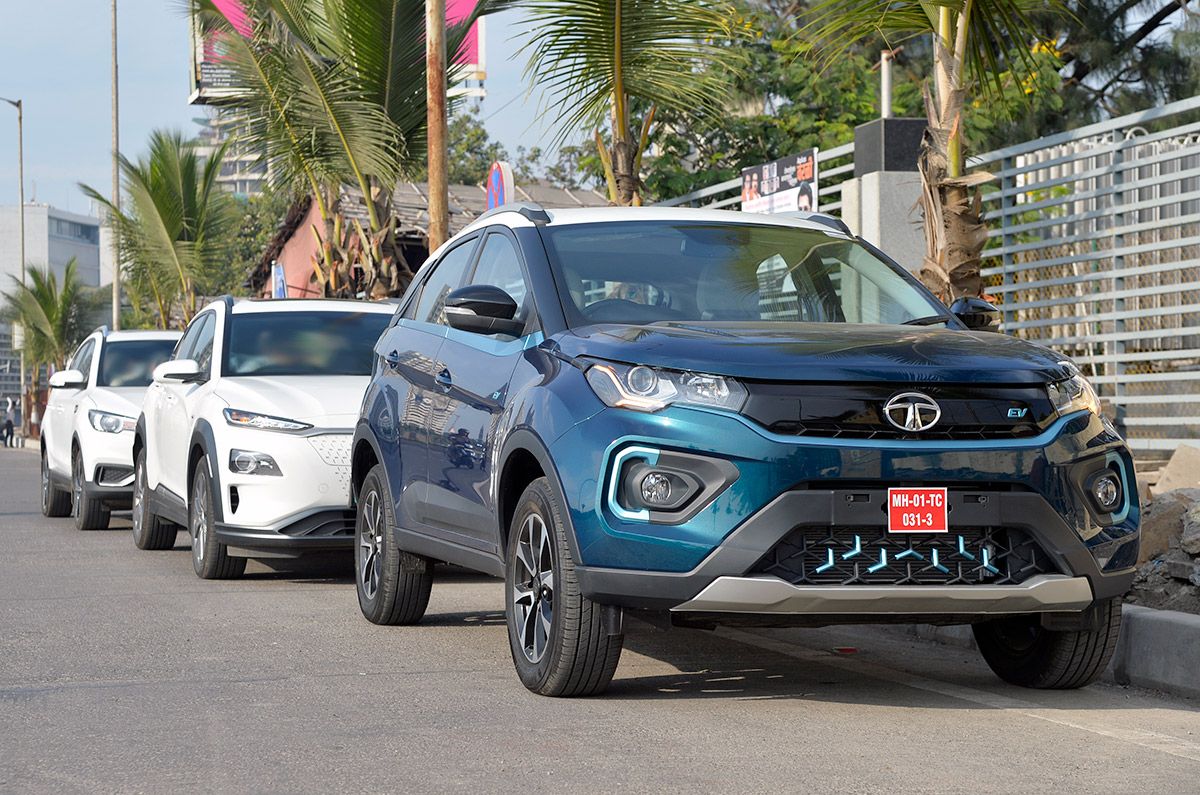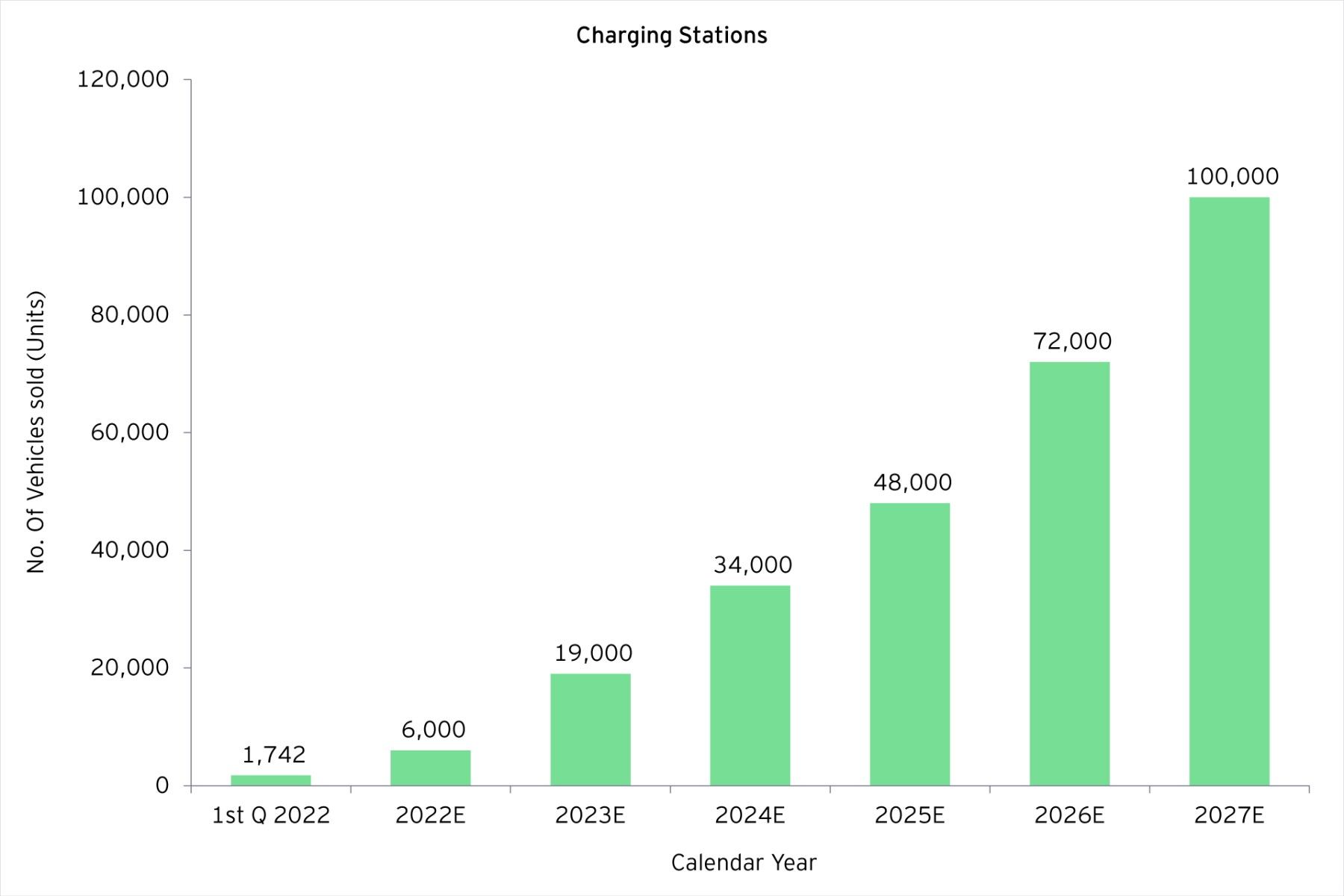Ad
Ad
Indian EV Market Trend 2022: The Indian EV Revolution is Accelerating
The Global EV market trends are contributing to the growth in the Indian EV sector. Meanwhile, the EV revolution in India is going at its pace, although the 2030 Global EV plan seems difficult to fulfill
The Global EV market trends are contributing to the growth in the Indian EV sector. Meanwhile, the EV revolution in India is going at its pace, although the 2030 Global EV plan seems difficult to fulfill.
In India, the electric mobility ecosystem is currently growing. Electric vehicle (EV) registrations saw a staggering 168% increase in 2021 compared to 2020. While the Government of India (GoI) is making efforts to lessen the nation's dependency on fossil fuels and make electric cars (EVs) the major replacement for internal combustion engine (ICE) vehicles, there is still much to be done before e-mobility is widely adopted in India.
According to EY's most recent report, Electrifying Indian Mobility, which was co-authored with the Indian Venture and Alternate Capital Association (IVCA) and INDUSLAW, formalizing the legal framework, promoting public awareness campaigns, and addressing logistical problems in the EV market can help secure the future of electric mobility in India.

In India, EV sales as of CY21 represent 1% of all vehicle sales. By CY27, this number is projected to soar to 39%, mostly due to the travel sector, particularly electric 2-wheelers (E2Ws) and electric 3-wheelers (E3Ws). Despite having a lower adoption rate (0.5% of all vehicle registrations), e-buses are likely to gain popularity as state governments call for bids to buy them. It's interesting to note that concerns with range anxiety, inconsistent duty cycles, and a lack of adequate charging infrastructure are predicted to delay the widespread adoption of electric 4-wheelers (E4Ws).

The momentum of investment is expected to grow steadily
Both the investments and overall EV sales are increasing.
The industry drew significant investments (about US$6 billion) in 2021, and it is anticipated that the US $20 billion will be attracted by 2030. Around US$1.7 billion was invested by PE/VC investors in 2021; by 2022, this amount had already surpassed the US $666 million.

With the number and size of the environment, social, and governance (ESG) funds increasing, the investment momentum is also anticipated to continue. A large number of new investors are hopping on board as the EV ecosystem grows.
The question now is, What is motivating these investments?

The drive by the federal and various state governments, which acts as a booster for EV businesses, is one of the motivating elements. Additionally, businesses are raising money to accelerate R&D, technology integration, testing, and expansion. Other drivers that are driving investments include the potential for 100% ownership through FDI, rising public awareness of sustainable transportation, and the overall objective of sustainability and emissions reduction.
More investments are being attracted by a supportive policy environment, which is promoting the expansion of the EV market. Investments in the EV market have increased significantly as a result of the second phase of India's Faster Adoption and Manufacturing of Hybrid and EV (FAME II) scheme. The program seeks to assist 1 million E2Ws, 55,000 E3Ws, and 5,00,000 E3Ws in addition to other EVs. E-mobility in India is anticipated to be boosted by recent statements addressing the localization of EV components, the allocation of INR57,000 crore through Production-Linked Incentive (PLI) schemes, and INR18,100 crore for advanced battery cells (ACCs).
EV adoption barriers

While there is no denying that EVs have advantages over conventional ICEs, there are still a number of issues that must be resolved if EVs are to have a bright future in India.
Infrastructure!!

The lack of charging infrastructure is now one of the main problems for the EV business in India, as there are only 1,742 charging stations in the entire nation. A hostile environment for operators is created by a lack of charging stations and other reasons such as high operating costs, unpredictability in station usage rates, and increased load on energy distribution companies.
However, politicians are acting to address this problem and offer legal backing for the construction of EV charging infrastructure. By 2027, there will probably be 100,000 charging stations, enough to accommodate the 1.4 million EVs that are anticipated to be on the roads.
Batteries!!

Lithium-ion batteries, which are commonly found in EVs, call for metals including lithium, magnesium, cobalt, and nickel. The aspirations of nations lacking these resources to manufacture EVs are dependent on imports. However, imports raise the cost of procurement, making EVs more expensive. India imported 450 million lithium-ion batteries in FY20 for close to US$865 million. These batteries also have a significant negative impact on the environment because extraction utilizes a lot of water, harms the soil, and contaminates the air. Furthermore, the components of lithium-ion batteries decay over time and cannot be utilized in new batteries, making the current recycling processes for these batteries ineffective. Alternatives to the lithium-ion batteries used in the automotive industry are being developed by several manufacturers, but their use is currently restricted.
R&D

India has a low level of R&D capacity, and its manufacturers mostly rely on the technological know-how of their international competitors for EV components, particularly in the area of battery technology. But things are quickly shifting. For instance, research on fast-charging technology and Indian market demands for electric car trends is being done by the Automotive Research Association of India.
Pollution
EVs are a cleaner, greener alternative to conventional ICE cars, making them a crucial component of the strategy to cut greenhouse gas emissions. However, EV production and use contribute to the deterioration of the environment. For instance, using the charging stations necessitates a heavy reliance on dirty thermal power plants. Determining that the power source is clean energy, such as solar, wind, or hybrid power plants, is crucial. Similar to this, alternative techniques are required to lessen the harm that the extraction of the metals used in lithium-ion batteries does to the soil, air, and water environments.
Way Ahead
According to the paper, quick decision-making, collaboration and coordination with stakeholders, ownership of EV infrastructure, government participation at multiple levels, and commitment to both short- and long-term goals are all necessary to achieve the rapid adoption of EVs in India.
The EY analysis offers additional recommendations for regulators, automakers, and battery manufacturers to help EV adoption and penetration in India.
Despite the difficulties, customer preferences for EVs are increasing in India as a result of trends in the worldwide EV market. The introduction of e-rickshaws, which have taken the place of traditional rickshaws in the public transportation industry because to their low cost, high energy efficiency, and low maintenance requirements, has boosted public awareness of EVs. In addition to Indian consumers' greater desire to utilise EVs, government incentives and subsidies will sweeten the deal and accelerate the expansion of the EV market in India.
More News
Ola Maps Announces New Pricing Structure and Future Product Roadmap
In a bold move, Ola Maps unveils a reduced pricing structure to challenge tech giants and boost Indian innovation.
19-Jul-2024 11:21 AM
Read Full NewsOla Maps Announces New Pricing Structure and Future Product Roadmap
In a bold move, Ola Maps unveils a reduced pricing structure to challenge tech giants and boost Indian innovation.
19-Jul-2024 11:21 AM
Read Full NewsExciting New Car Launches Expected in October 2023: A Sneak Peek at the Latest Models
Discover the latest car launches from luxury to electric, Nissan Magnite AMT, Lexus LM MPV, Force Gurkha 5-Door and others, expected in October 2023.
30-Sep-2023 04:28 PM
Read Full NewsExciting New Car Launches Expected in October 2023: A Sneak Peek at the Latest Models
Discover the latest car launches from luxury to electric, Nissan Magnite AMT, Lexus LM MPV, Force Gurkha 5-Door and others, expected in October 2023.
30-Sep-2023 04:28 PM
Read Full NewsTesla making it easier to buy electric cars, giving loans with 7-year terms
Tesla is now making the electric cars buying journey more easier for the buyers, offering 7 year term loan.
24-Jul-2023 03:13 PM
Read Full NewsTesla making it easier to buy electric cars, giving loans with 7-year terms
Tesla is now making the electric cars buying journey more easier for the buyers, offering 7 year term loan.
24-Jul-2023 03:13 PM
Read Full NewsFour-Wheeler Diesel Engine Come to an End by 2027 | Energy Transition Panel Statement
Diesel Cars ban in these cities till 2027 said the Energy Transition Committee.
08-May-2023 01:38 PM
Read Full NewsFour-Wheeler Diesel Engine Come to an End by 2027 | Energy Transition Panel Statement
Diesel Cars ban in these cities till 2027 said the Energy Transition Committee.
08-May-2023 01:38 PM
Read Full NewsHyundai Takes Over GM's Talegaon Plant: A Step Forward in Automotive Industry Expansion
Hyundai Motor India signs a non-binding term sheet agreement with General Motors India to acquire identified assets related to the Talegaon Plant in Maharashtra.
13-Mar-2023 04:25 PM
Read Full NewsHyundai Takes Over GM's Talegaon Plant: A Step Forward in Automotive Industry Expansion
Hyundai Motor India signs a non-binding term sheet agreement with General Motors India to acquire identified assets related to the Talegaon Plant in Maharashtra.
13-Mar-2023 04:25 PM
Read Full NewsMaruti Suzuki Jimny Special Edition's Retro Stripes: Get Ready to Turn Heads
Maruti Suzuki Jimny has unveiled the Heritage Edition which features retro body decals and decorations.
06-Mar-2023 11:07 AM
Read Full NewsMaruti Suzuki Jimny Special Edition's Retro Stripes: Get Ready to Turn Heads
Maruti Suzuki Jimny has unveiled the Heritage Edition which features retro body decals and decorations.
06-Mar-2023 11:07 AM
Read Full NewsAd
Ad
Cars In India
Mercedes-Benz G-Class with EQ Power
₹ 3.00 Cr
Toyota Camry
₹ 48.00 Lakh
Honda Amaze
₹ 8.00 - 10.90 Lakh
Audi Q7
₹ 88.66 - 97.81 Lakh
Mahindra XEV 9e
₹ 21.90 - 30.50 Lakh
Tata Harrier EV
₹ 24.00 - 28.00 Lakh
MG M9 EV
₹ 1.00 - 1.10 Cr
Maruti e Vitara
₹ 20.00 - 25.00 Lakh
Hyundai Creta EV
₹ 22.00 - 26.00 Lakh
MG Cyberster
₹ 60.00 - 65.00 Lakh
Ad
Ad
Ad